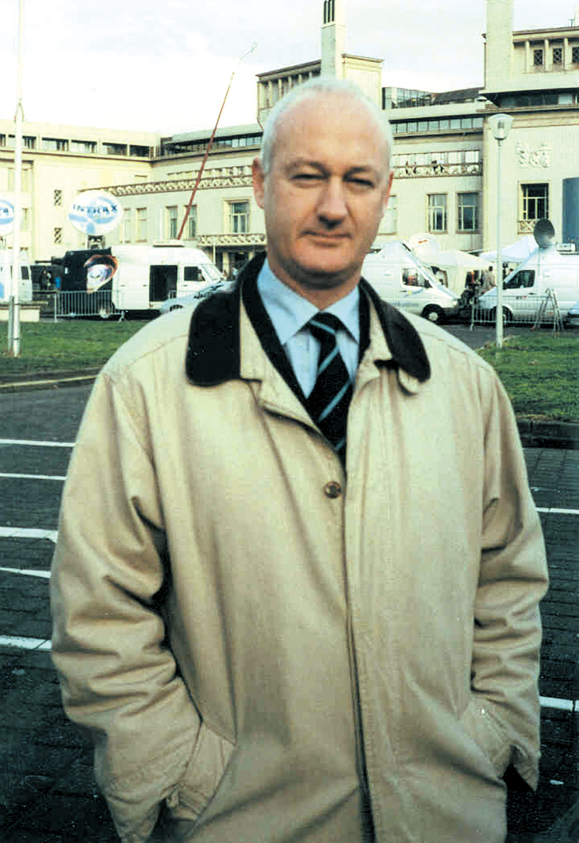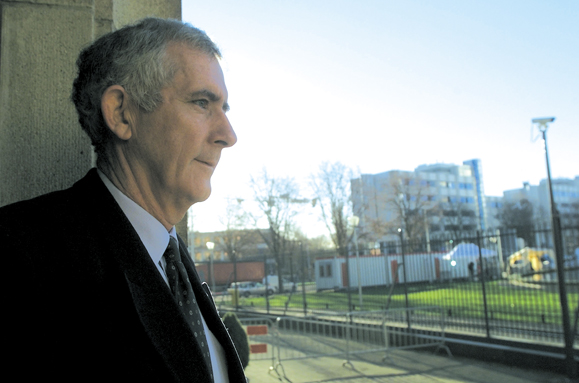Two Dubliners at the Milosevic Trial.
℘℘℘
When Slobodan Milosevic was escorted into the War Crimes Tribunal at The Hague last February it seemed the world was waiting. TV satellite vans were lined bumper-to-bumper with hundreds of reporters and photographers jousting for position.
Milosevic being the first head of state to be indicted as a war criminal while in office, the significance of the event was not lost on those who witnessed it. However, with the trial expected to run for two years it’s not surprising that the media cavalcade soon moved on, ready to return for the appearance of star witnesses or when the trial finally rumbles to a verdict.
Until then two Irishmen will shadow the man regarded as Europe’s most wanted man. UN crime investigator Gerard Sexton will help build the case against the deposed leader of former Yugoslavia while another Dubliner, Tim McFadden, will be Milosevic’s jailer.
McFadden knows he’s in for the long run. The former Irish Army commandant is governor of the war crimes detention unit at Scheveningen Prison in The Hague.
“Presumption of innocence is utmost in our minds,” he insists, pointing out that the men in custody are remandees rather than prisoners. “You have to drill that home to staff. They read in the papers something like the trial today will last two years and Slobodan Milosevic will spend the rest of his life in jail. The thing is he’s under our jurisdiction and it’s very important that we afford him his rights and protect his dignity.”
To millions of victims talk of rights is seriously misplaced. With commendable detachment, however, McFadden points out that five cases at The Hague — including the last three appeals — have led to acquittals. He is there to govern, not to judge.
Gerard Sexton, one of six gardai (Irish police officers) currently working at The Hague, never noticed the crowds when the Milosevic trial began. For the Dublin-born crime investigator February 12 was just another day at the office. He left his nine-year-old daughter Saoirse at school and entered work through the back door.
“You try to avoid the circus — sure I didn’t even look out the window,” he shrugs. “The general feeling was, that day was a major move forward. The wheels have been turning for some time, but for all of us at the Office of the Prosecution, that’s what we’re aiming at. The day in court.”
The lifeblood of the tribunal is unwavering faith in international law. A day in court is the means by which the good are honored, the bad punished and the innocent protected. Sadly, however, much of it is a bit late, particularly for the innocent.
“I realize that some of the prisoners have done terrible things but let’s not confine `victims’ to those who are being charged here,” feels McFadden. “I’m not defending the people in custody and being charged but they are in some ways a victim of circumstance, like a soldier who’s doing what he’s told.”
Spoken like an army man and it’s hardly surprising. Born in Dun Laoghaire, the former Irish Army officer served on U.N. peace-keeping tours in Lebanon, Namibia and the Golan Heights. He became deputy governor of the Curragh Prison in Co. Kildare, later rising to governor (1975-81). “That was a very difficult prison to run,” he acknowledges, referring to bitter clashes with IRA prisoners which led to a series of dirty protests. “It was an us-and-them situation, management and inmates. I was never going to let that happen again.”
McFadden retired from the army as commandant but when the War Crimes Tribunal for Rwanda set up he took charge of the facility for Hutu prisoners in Tanzania. Five years ago he transferred to Scheveningen, upgrading its capacity to 70 prisoners guarded by 75 wardens and support staff.
“I put all the prisoners together,” he says, arguing that segregation leads to tension. “They have a lot of respect for each other and really, they’re forced to live as a community. If there are tensions they will be more personality clashes than anything on ethnic grounds. They say they speak different languages but it’s the same bloody language. When they play traditional music from that part of the world their feet all tap to the same music.”
Gerard Sexton shares McFadden’s belief in due process. And with good reason — his grandfather Denis was a sergeant in the Gardai, his father John followed suit, while Gerard and his brother Denis also entered the force. “Yeah it’s pretty unusual,” he feels. “I was pretty much surrounded by cops growing up and when I joined in 1980 I was delighted to wear a uniform and keep the peace.”
He married a year later. When he was posted to Yugoslavia as a UN police monitor nothing prepared him for the carnage of war. “I’d never seen anything like it,” he admits. “A culture shock. That level of aggression, violence, death. There’s no doubt you are affected by it — if you’re not, there’s something wrong with you — but I suppose it does show the human ability to adapt. People just got on with it.
“Coming back to Ireland it took me a long time to normalize,” recalls Sexton, now 42. “For example, I remember taking my kid to St. Anne’s Park (in Dublin) and walking onto a football pitch. And suddenly I’d think, `We’re off the footpath! Have I checked for mines?’ You can’t change, because you’ve seen people step off the hard top and had their legs blown off. That kind of thing will stay with you.”
He switched to the garda detective unit and four years later saw a job notice for U.N. investigators in the Balkans. “It takes a very short period to re-ignite that interest,” he accepts. “It’s the big game. It’s very attractive — that sounds very mercenary because it’s someone else’s war and you can go home at the end of it — but it’s also very gratifying if you can help someone along the way.”
By August ’98 the Sextons had their bags packed. The investigator would be assigned to the unit probing the Serb leadership. Within months Kosovo erupted.
Under case number IT-02-54 Slobodan Milosevic faces three wide-ranging indictments, including three separate charges of crimes against humanity and one charge of genocide against Bosnians. To those who suffered under his reign he is the face of evil; to a declining number of supporters he is the victim of Western bullies.
The International Criminal Tribunal for the former Yugoslavia (ICTY) models itself on trials in Nuremberg and Tokyo after World War Two. It was at Nuremberg that “crimes against humanity” became a legal term.
Moves to set up a Yugoslav tribunal began at the height of the Bosnian conflict in 1992. The US State Department named ten suspected war criminals, headed by Milosevic. At the time it seemed like another way to avoid action, as though the outside world decided to let the cancer spread and plan ahead for autopsy.
Ten years and several hundred thousand victims later the former president stands before a three-judge court. The chamber is separated from the gallery by bulletproof glass but there he is. Who could have imagined it seven years ago? Slobodan Milosevic finally on trial.
Now 60, his jowled face is framed by grey hair brushed back. His hands are pudgy, his cufflinks are gold, his black shoes have no laces. At various times he is attentive, bored, distracted, quarrelsome, indifferent, feisty, relaxed, angry.
He does not bother with translation. He listens to the prosecutor in English and responds in Serbo-Croatian. “I don’t see why I have to defend myself in front of a false tribunal and on false indictments,” he told a pre-trial hearing.
In refusing to recognize its legitimacy he also declined to appoint a defense counsel. He represents himself. When he is silent it is impossible to read his state of mind. He drifts from tetchiness to indifference. Now and again he scribbles notes on loose sheets of paper, then sits back, occasionally jolted by the sight of his own visage on the TV monitor in front of him.

Through an emotive five-hour opening statement by trial attorney Geoffrey Nice, all the blame was laid at the former Yugoslav leader. Milosevic looked bemused. He regarded the gallery, scanning it for familiar faces. Our eyes meet through the glass and he holds my stare.
“It doesn’t bother me that he’s demonized but if you were in the same position how would you feel?” Tim McFadden asks later. “I presume he himself feels he hasn’t done much wrong — I don’t know.
“Of course I build up a rapport with the detainees. I know them as well as anyone else on earth knows them. It wasn’t my choice for it to be like this, but I think it gives me a much more moderate perspective than the layman reading the papers about them. You see stuff about Slobodan Milosevic being a suicidal depressive. In fact he’s a very reasonable man in custody.
“He knows I’m not a participant in the judicial process and as a governor of the prison I discharge my duties without prejudice or favor. He knows that because he can see it. He doesn’t look for any special favors. Whether he respects me for it or not, he understands my position. You can’t look inside someone’s head and tell if he respects you.”
Gerard Sexton’s unit is currently investigating Belgrade’s former leadership. “I’m probably a little detached from him, both personally and professionally. My job is to find out what he’s responsible for. If he’s responsible for something we will show that and if he’s not responsible we’ll show that too. I am satisfied he’s ultimately responsible for a lot of what happened.” The Dubliner pauses. “But it wasn’t him alone.
“I’m coming from a background of 18 years policing — if you interview ten people about a traffic accident you wonder if you are talking about the same accident. The majority of the world saw this war on Sky News and CNN but was that the truth? Everybody has their own version of things. My job is to try and present to the court as many facts as possible and let the court decide what is the truth. The Serbs deserve to find out what the truth is as well.”
The investigative path has taken Sexton to refugee centers throughout Europe. For the first time forensics can be used as evidence of a war crime. “Kosovo was very, very real,” he recalls. “The bodies we exhumed were quite fresh rather than skeletons and there was a great motivation among the teams working there. We felt there was a demand on us to record this while we could.
“At the end of working days we’d sit with the families on the floor. As far as they were concerned the world let them down. Some were very angry and some were very grateful. At least in some sense we gave them an impression somebody was doing something. But that’s the proof of the pudding — to put the bad boys in jail.”
It’s an expensive, protracted process. Almost 1,100 people work at The Hague where the ICTY’s budget spiraled from $45 million in ’94 to over $104 million last year. Just 16 trials have been completed with 11 returned guilty after appeal.
Such a slow process lends support to a more streamlined model in the shape of an International Criminal Court (IIC). “I think it’s inevitable,” says the investigator, noting U.S. opposition. “History has shown there’s always going to be conflict and we need an agency to respond to it. In a perfect world we wouldn’t need a tribunal like this. But we do.” ♦


Leave a Reply